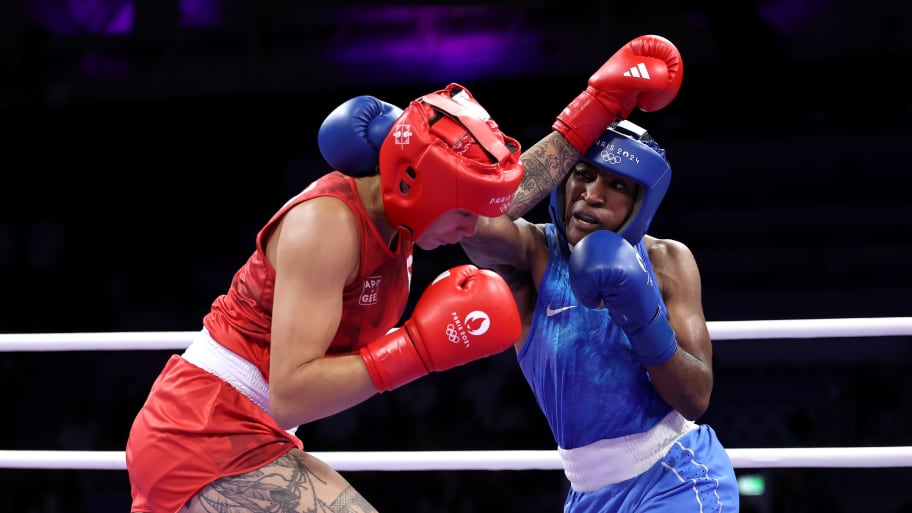
SEINE-SAINT-DENIS, France — She lives in Great Britain, but she isn’t British. She grew up in Cameroon, but she can’t go back. Surely, Cindy Ngamba belongs somewhere. How about the medal stand?
Ngamba upset Canadian boxer Tammara Thibeault in the round of 16 on Wednesday, putting her one step closer to history. Since the Refugee Olympic Team first competed in the 2016 Games in Rio de Janeiro, no refugee has won a medal. Well, it’s hard to flee the literal worst situations in the world and then beat everybody who didn’t have to do that. But Ngamba’s story is different from most of her teammates.
She left her home country.
Then, years later, she became a refugee.
“I didn't escape from war [in] Cameroon,” Ngamba said Wednesday evening. “I left Cameroon mainly for a better life.”
Ngamba had family in Great Britain, and so she moved there at age 11. The move was difficult. Ngamba’s first language was French and … well, here we turn to her official Olympics bio: She was “bullied in school for her poor English, her weight, and her body odor.” A pair of gym teachers looked out for her. Ngamba became a boxer.
Even now, after living in England for 15 years, Ngamba has a thick accent. She competes in the 165-pound division. I cannot speak to her body odor these days, but I do not recommend bullying her for it. Thibeault can back me up on what happens if you challenge Ngamba.
When Ngamba was 20, she was nearly deported to Cameroon, where her existence is illegal. Ngamba is a lesbian. Homosexuality is criminalized in Cameroon. Members of the LGBTQ community are often violently assaulted—and when they are assaulted, sometimes they get arrested.
Ngamba did not want to go back. But she is also not a British citizen. She managed to avoid deportation, and now she is here, showing Cameroon what it’s missing.
Since Cameroon’s first Olympic appearance in 1964, the country has won six medals. Missing out on a seventh obviously won’t move Cameroon’s government to change its laws. But on June 30, Brenda Biya, the daughter of Cameroon’s president, came out as a lesbian on Instagram, in part to help the LGBTQ community in Cameroon. (Biya lives in the United States and Switzerland.) Biya and Ngamba are just two nudges toward progress, but they are nudges that Cameroon desperately needs.
When a reporter started asking Ngamba about her sexuality Wednesday, she put up her hand, as if to say stop, and answered another reporter’s question. It was not clear if she was avoiding the topic specifically or was just saying she could only answer one question at a time. But Ngamba knows that her story, like all of the best Olympic stories, is not just her own.
“Many, many refugees around the world that are not even athletes, that are going through so many issues and so many obstacles, and they don't believe in themselves, they feel like it's the end of the world,” Ngamba said. “And I hope that [those] watching me can see that through anything in life that I've gone through, I was able to overcome it.”
There are 37 refugees competing here under the Olympic flag. It is easy to think of them as athletes with no team. But Ngamba, a flagbearer for the refugee team, is an athlete with two teams.
She considers the British boxers her teammates, and the three British women who lost here helped motivate her: “They train so hard, they listen to the team, they listen to the corner, and just like that, it was taken away from them.”
Ngamba also knows that if she wins a medal, it would be a win for the entire refugee team.
“The refugee team believing in me, that I'm going to become the first ever refugee to make it up there … there's a lot of pressure,” Ngamba said. “I have feelings, I have emotions. And I'm not going to hide about that. I'm going to speak out. But I never let pressure bring me down or make me question myself.”
Back in Cameroon, 91-year-old president Paul Biya is in his 42nd year in power, a reign marked by accusations of rampant corruption and ruthless suppression of dissent. Here in Paris, 25-year-old Cindy Ngamba keeps on fighting. The government is on Biya’s side. But time is on Ngamba’s.
This article was originally published on www.si.com as Cindy Ngamba Has a Fighting Chance at the Refugee Olympic Team's First Medal .







